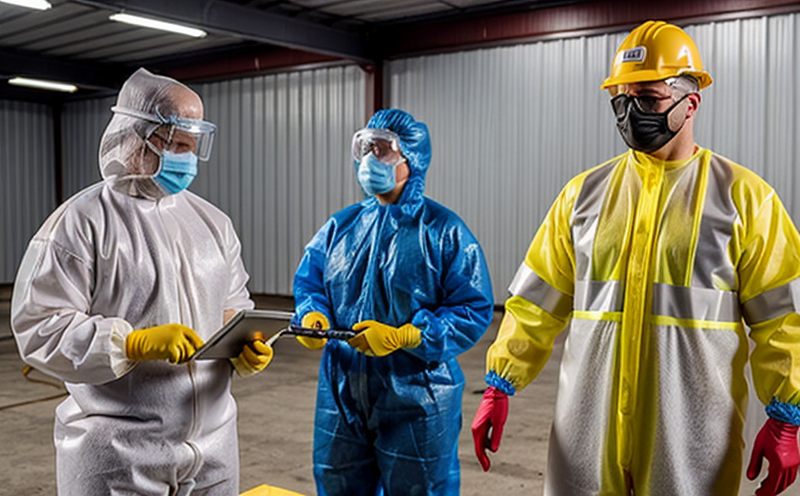ASTM F2100 Medical Mask Differential Pressure Testing
The ASTM F2100 standard provides a framework to evaluate the performance of medical masks, particularly their ability to resist penetration by infectious agents. Differential pressure testing is one critical method used within this standard to assess the integrity and filtration efficiency of medical masks.
Differential pressure testing measures the pressure difference between the inside and outside air when the mask is subjected to a controlled airflow. This test evaluates how well the mask can prevent air from passing through it, which is crucial for ensuring that the mask maintains its intended barrier properties against infectious agents.
This service involves precise laboratory procedures using specialized equipment to ensure accurate measurement of differential pressure. The testing process helps manufacturers and users understand the performance characteristics of medical masks under various conditions, thereby enhancing safety and efficacy in healthcare settings.
The process begins with thorough preparation of the sample according to ASTM F2100 requirements. This includes ensuring that the mask is clean and free from any external contamination. Once prepared, the specimen undergoes differential pressure testing using a precisely calibrated instrument. The test involves applying a known airflow through the mask and measuring the resulting pressure difference.
The results of this testing are crucial for quality assurance purposes. They provide insights into the performance of medical masks under real-world conditions, helping to ensure that they meet or exceed regulatory standards. This information is particularly valuable for healthcare providers and manufacturers who rely on accurate data to make informed decisions about product design and efficacy.
Our laboratory adheres strictly to ASTM F2100 guidelines ensuring consistent and reliable results. By leveraging advanced testing technologies, we provide comprehensive reports that include detailed measurements of differential pressure, alongside other relevant performance metrics. These reports are essential for verifying compliance with regulatory requirements and supporting evidence-based claims about product performance.
Our team of experienced professionals is dedicated to delivering accurate and actionable insights through our ASTM F2100 testing services. We work closely with clients from various sectors including healthcare providers, manufacturers, and government agencies to ensure that all aspects of the testing process meet industry standards. Our commitment to excellence ensures that every report reflects the highest level of accuracy and reliability.
Scope and Methodology
| Test Parameter | Description |
|---|---|
| Differential Pressure | The pressure difference between the inside and outside of the mask during airflow. |
| Flow Rate | The controlled airflow applied to the specimen. |
| Measurement Point | The location where differential pressure is measured. |
| Equipment Used | Description |
|---|---|
| Differential Pressure Tester | An instrument designed to measure the pressure difference across a specimen. |
| Airflow Controller | Precisely controls and monitors the airflow through the mask during testing. |
| Specimen Holder | Holds the medical mask in place for accurate measurement. |
The ASTM F2100 standard outlines specific procedures for conducting differential pressure tests on medical masks. These include selecting appropriate test specimens, preparing them correctly before testing, and applying a controlled airflow to measure the resulting pressure difference accurately. Compliance with these procedures ensures reliable results that can be used confidently by those responsible for ensuring product quality.
The methodology also involves analyzing data collected during testing to determine compliance with specified limits set out in ASTM F2100. This analysis includes examining trends over multiple tests, comparing results against established benchmarks, and identifying any potential areas of concern or improvement needed within the manufacturing process.
Quality and Reliability Assurance
Our laboratory is committed to providing high-quality testing services that meet or exceed industry standards. To achieve this goal, we follow strict quality control protocols at every stage of the testing process—from sample preparation to final analysis.
- Precision Calibration: Our instruments are regularly calibrated using certified reference materials to ensure accurate measurements.
- Data Integrity: We maintain comprehensive records of all test results, ensuring transparency and traceability throughout each project.
- Training and Certification: Our staff members undergo continuous training and certification programs to stay current with evolving industry practices and guidelines.
We understand that trust in our services is paramount for clients across different sectors. By adhering strictly to ASTM F2100, we ensure consistency and reliability in every test conducted here. This commitment translates into greater confidence among stakeholders when making decisions based on our findings.
International Acceptance and Recognition
- American National Standards Institute (ANSI): ASTM F2100 is recognized by ANSI as a consensus standard, ensuring its wide acceptance within North American markets.
- European Committee for Standardization (CEN): While not directly referenced in this standard, similar procedures are followed under EN 149:2001+A1:2010 for respirators.
- World Health Organization (WHO): Although not explicitly mentioned, the principles behind ASTM F2100 align closely with WHO recommendations on mask performance.
- International Organization for Standardization (ISO): While there isn't an exact ISO equivalent to ASTM F2100, its methodology is consistent with general ISO guidelines for respiratory protective equipment testing.
The widespread adoption of ASTM F2100 in various regions reflects its importance as a benchmark for evaluating medical mask performance. Its acceptance by key international bodies underscores the global relevance and credibility of this testing procedure.





